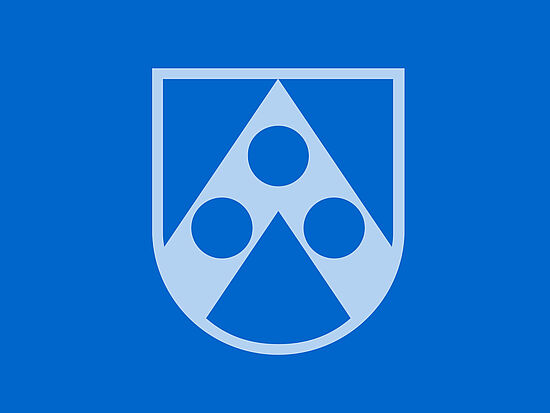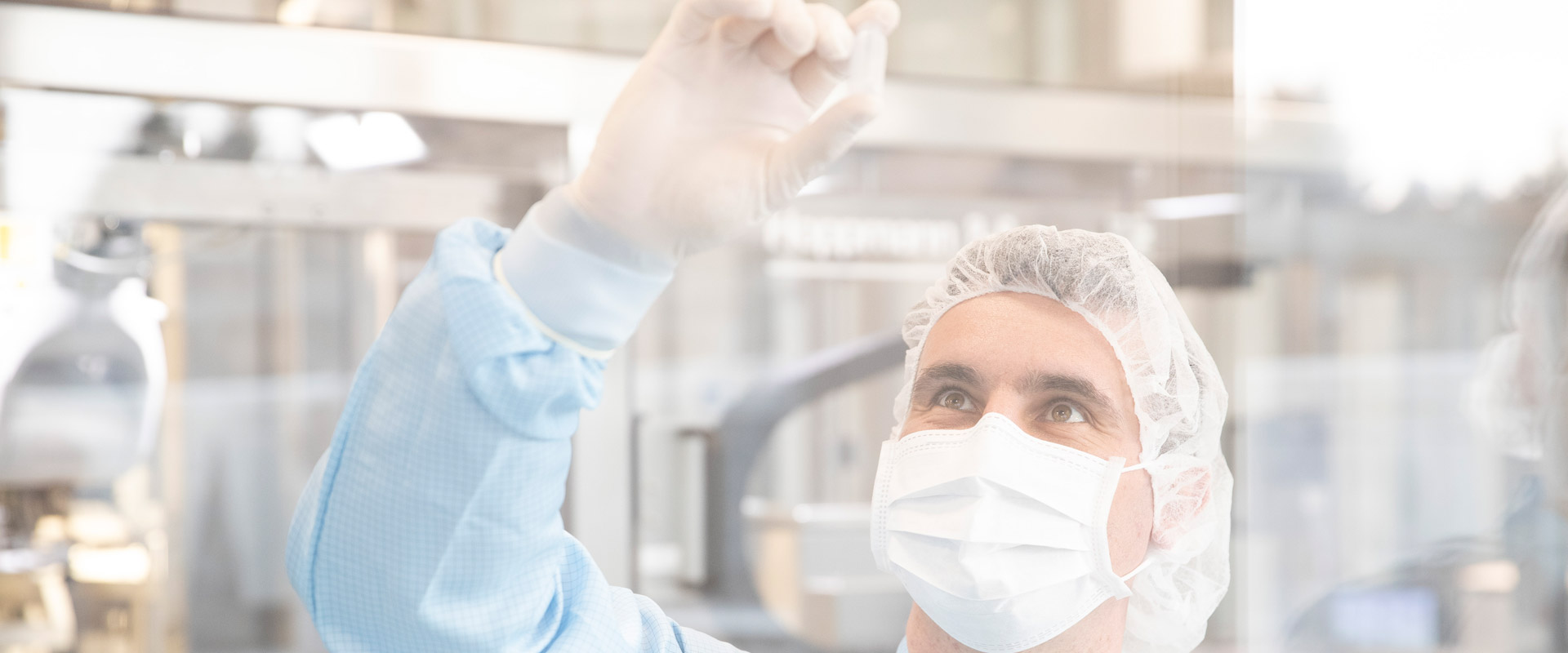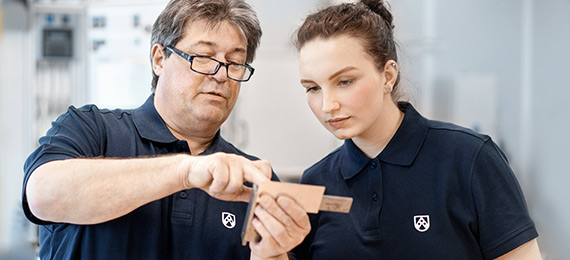- Earnings were increased to € 36.4 m
- Net financial debts were reduced from € 134.4 m to € 61.6 m
- Total order value and turnover attained virtually the same level as in the previous year
- Good positioning in China’s growth market
- Good results and further improvement in the Group’s financial situation are expected for 2004
Mannheim, Germany, 9 June 2004. The Röchling Group, which consists of three divisions, Engineering Plastics, Automotive and Electronics, experienced a positive development in its activities in fiscal 2003 despite the fact that the business year was clearly influenced by a weak economy. A globally operating group of companies focusing on the field of technology, Röchling was considerably affected by the difficult market situation and costs incurred as a result of its restructuring measures. It was nevertheless able to increase its pre-tax earnings (EBT) slightly to € 36.4 m (2002: € 35.1 m). The group turnover fell by 0.9 per cent to € 1,523 m, as did the total order value, which amounted to € 1,469 m. The number of people employed by the Group was reduced by 1.2 per cent to 9,102.
“In view of the unfavourable economic situation last year and the great pressure to cut costs we came under as a result, we’re satisfied with the outcome,” said Georg Duffner, President and CEO Röchling Group, commenting on the course of Röchling’s business activities.
“We attained our goal of increasing our earning power and considerably improving our financial situation,” he continued. The Group was able to reduce its net financial debts from € 132 m to € 62 m, for example. In all, the Röchling Group has reduced its level of debt by more than € 200 m in the past three years. In fiscal 2003 its free cash flow amounted to € 81 m.
Extending its technological leadership
There were two reasons for the increase in earning power, according to Duffner, the first being systematic cost-cutting and a strict approach to making cost savings. The second was the company’s drive to enhance both process and product development and strengthen its position as a technological leader in a large number of sectors. Röchling Engineering Plastics, for instance, was able to reduce the processing costs for one of its large customers by manufacturing extruded plastic sheets that were 16m long, 3m wide and 30mm thick. The automotive division developed ultralight underbody panels for the BMW 5 series that weigh 30 per cent less than previously used materials while retaining the same degree of durability. DeTeWe also drew a lot of interest from visitors at the CeBIT trade fair partly due to its new OpenCom 36lan Internet communications system, the first system supporting the new “MMS in the fixed network” service, and partly due to the OpenCom 130, its modular communications system with up to 100 ports.
Well-positioned in expanding markets
The improvement of Röchling’s position in growth markets was a key factor in the positive development of the Group. For one, its position in the United States was improved as a result of large orders it won in the plastics sector. Investments were prioritised in a number of countries, with the emphasis being placed on China. Duffner said he expected “further pleasing contributions to the Group’s financial results” as a result of Röchling’s corporate activities in that country.
Engineering plastics: releasing synergies through fusions
The Engineering Plastics division had a difficult year due to the situation on the electricity market (power generation/power distribution). It managed to moderately increase its turnover by 2 per cent, reaching € 296 m, and it increased the size of its workforce by 5 per cent to 1,653 employees. Röchling Haren KG and its subsidiary Röchling Trovidur KG merged on 1 January 2004 to form Röchling Engineering Plastics KG, a move enabling both companies to benefit considerably from potential synergies. The new company is a world leader in its field, manufacturing the entire range of semi-finished products and machined parts made from thermoplastics and duroplastics. Two of the most significant product innovations to be currently marketed are “Durolight”, a new insulating material with an extremely low specific weight and a particularly low thermal conductivity, and the soldering mask material known as Durostone CLF 280. The latter is significantly better than conventional materials with respect to its resilience and resistance to temperature.
Engineering Plastics strengthened its international sales network by setting up a subsidiary company in India. In addition to this, it took over operations at Röchling Technické Plasty s.r.o. in Tabor, Czech Republic. Sustaplast gained more space with which to expand its production facilities at its Lahnstein site in Germany due to the acquisition of bordering land belonging to the German Armed Forces.
Automotive division increases turnover
For Röchling’s automotive division, the year 2003 was not only characterised by price erosion caused by car manufacturers, but also by the increasing cost of materials. In spite of these unfavourable conditions, the division increased its turnover by 10 per cent, pushing it up to € 606 m. The number of staff employed rose by 4 per cent to reach 3,648. The Seeber Group streamlined its production processes and also reduced its administrative costs, shutting down two sites in Dachau and Emmering and relocating part of its development department and the production facilities in Emmering to Gernsbach and Peine. At the same time as this was done, the facilities in China were expanded - a new workshop was set up in Changchun for the production of door trim for the Audi A4. Röchling Kaltwalzwerk KG, which cold-rolls steel, invested in a new bonderising machine. This coats cold-rolled steel with a zinc phosphate film, thereby optimising it for further processing in the automotive industry.
The Electronics division: DeTeWe undergoes restructuring
The Electronics division of the Röchling Group is the largest area of the organisation. Its turnover fell by 7.5 per cent to € 630 m and the number of people employed dropped by 8 per cent, reaching an end-of-year figure of 3,764. Although it developed several very successful products in 2003, the DeTeWe Group ended the year with a loss. This was largely due to the drop in prices on the market for telecommunications equipment and the heavy costs incurred as a result of the reorganisation of Funkwerk Köpenick. For DeTeWe the business year was heavily influenced by restructuring measures. DeTeWe concentrated on expanding its European sales operations and in addition it focused more on specialist retailers and its IT business.
Gossen-Metrawatt and Francotyp-Postalia, the two subgroups of Röchling, attained the best operative results, profiting from a stable market and successful innovative products. Francotyp-Postalia, for example, produced a new generation of inkjet franking machines for franking 30 to 300 letters. The emphasis of research was put on preparation for the conversion to Deutsche Post AG’s new franking software FranKIT. Since 1 April 2004, Deutsche Post AG (Germany’s postal service) has only been accepting letters stamped using this program. Being the market leader in franking machines, Francotyp-Postalia feels it has excellent potential for growth in this segment.
Getting off to a good start in 2004
Almost all of the groups of companies got off to a good start in the new year. In April 2004 earnings before tax (EBT) reached € 12.7 m (compared with € 7.1 m in Q1 of 2003), whilst profits prior to tax and interest (EBIT) rose by 29 per cent to € 15.7 m. In the same period, turnover fell by 4 per cent to € 467.3 m and the total order value dropped by 7 per cent to € 471.7 m. Two reasons for this are the existing problems on the telecommunications market and the sell-off of peripheral business operations. As a result, the number of employees was cut by 5 per cent, falling to 8,255 by year-end.
Perspectives for the rest of 2004: the Röchling Group expects the positive trend to continue
The Röchling Group forecasts that in fiscal 2004 it is likely to further increase its earning power by a significant amount. The situation on the telecommunications market will remain difficult, however. DeTeWe’s business operations will consequently continue to be influenced by stringent cost reductions and the reduction of its staff overhead. At the same time it will continue to enhance its sales potential. “We expect a good result and the further improvement of our financial situation in 2004,” said Duffner optimistically. “The good opportunities for growth in the engineering plastics and automotive division and are essential if this is to be achieved, as are the creation of further innovative products, additional cost reductions and our continued expansion in China,” he explained.
THE RÖCHLING GROUP - A CORPORATE PORTRAIT:
A globally operating group of companies focused on technology, the Röchling Group consists of three main sectors: Engineering Plastics, Automotive and Electronics.
The Engineering Plastics division is made up of the Röchling Engineering Plastics Group and the Sustaplast Group and manufactures a wide range of high-performance products for industrial use. In particular, the division meets the increasing demand for lightweight materials that can be moulded very easily and yet are extremely strong. In addition to these characteristics, the products made have an exceedingly high resistance to wear and abrasion, glide smoothly and provide optimal insulation.
The areas of competence in the Automotive division, which embraces the Seeber Group and Röchling Kaltwalzwerk KG, include the production of lightweight plastic components made for almost all well-known car manufacturers worldwide. Such components are used in engine compartments and vehicle unterbodies and interiors. Besides this, the division manufactures cold-rolled, bonderised and hardened hoop steel, which is mainly used for producing engine parts.
The Electronics division includes the three sub-groups DeTeWe, Francotyp-Postalia, BEA and the FHF. Francotyp-Postalia has become one of the world’s leading suppliers of digital franking and enveloping machinery for use in the automated processing of mail. With a broad range of innovative products designed for voice and data communication, DeTeWe is now ranked as a market leader in Europe. In addition to these activities, the Röchling Group also produces industrial plants, mainly for areas such as electrical engineering and automation.






